2021届人教版高三英语课件:句子的重音和语调(50张ppt)
文档属性
| 名称 | 2021届人教版高三英语课件:句子的重音和语调(50张ppt) | 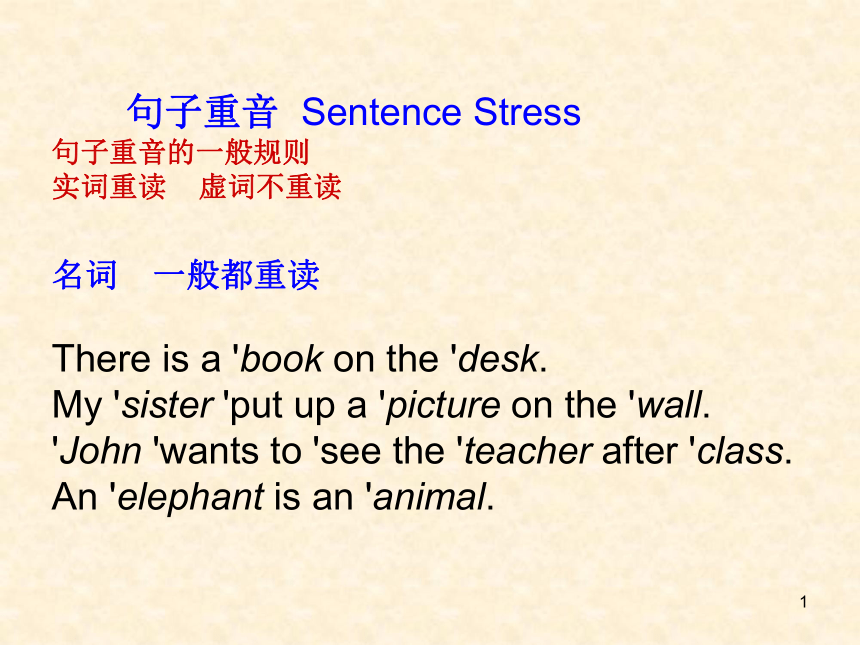 | |
| 格式 | ppt | ||
| 文件大小 | 768.2KB | ||
| 资源类型 | 教案 | ||
| 版本资源 | 人教版(新课程标准) | ||
| 科目 | 英语 | ||
| 更新时间 | 2021-02-14 00:45:09 | ||
图片预览

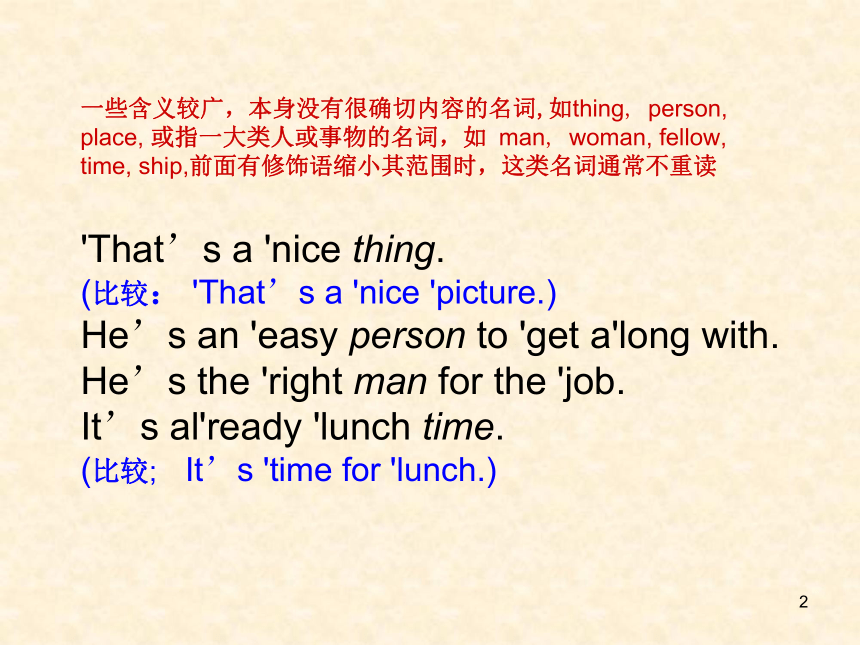

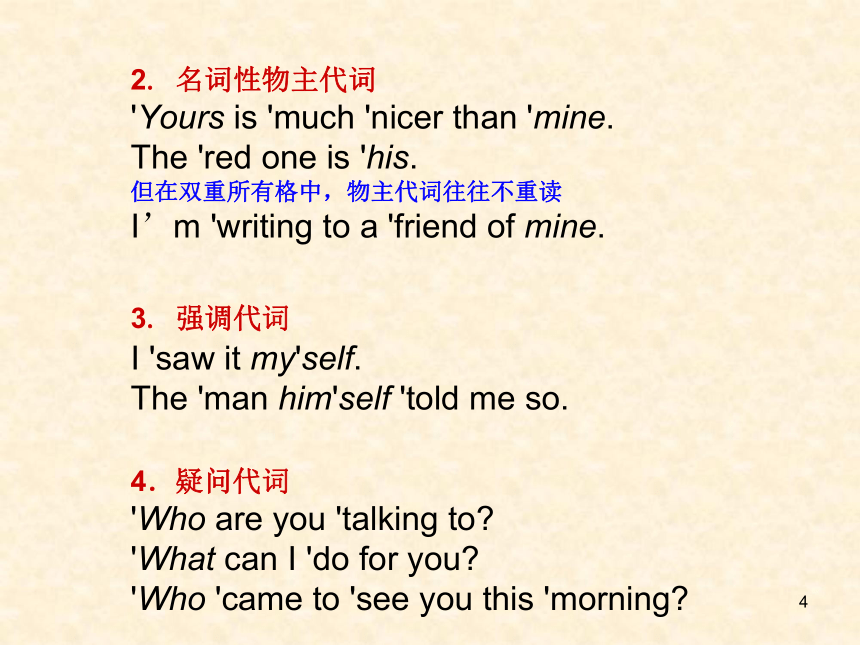
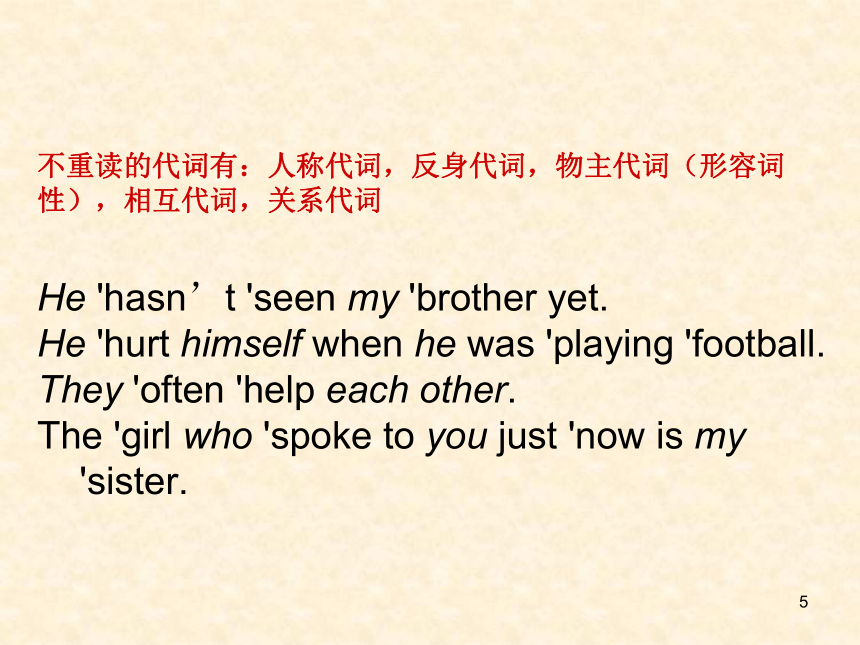
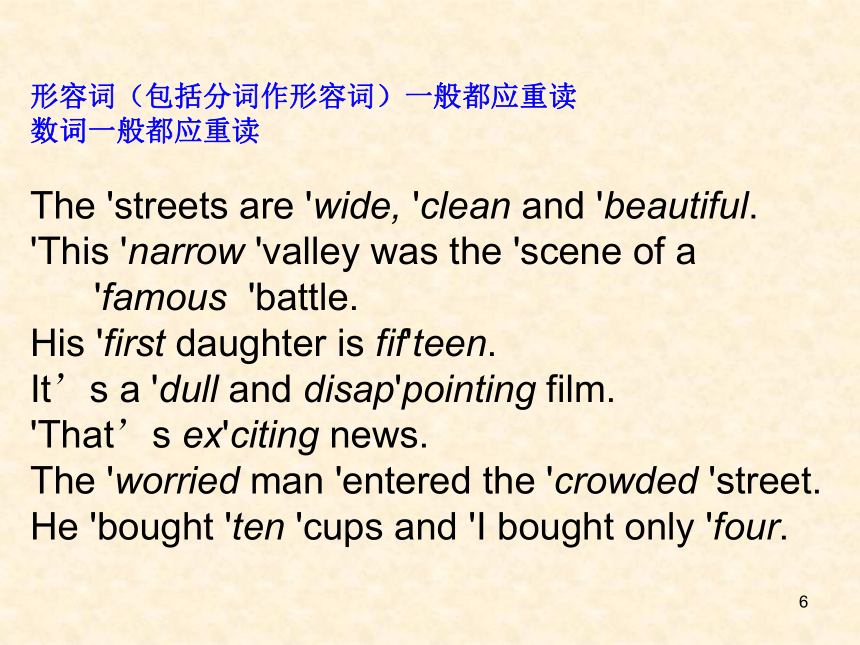
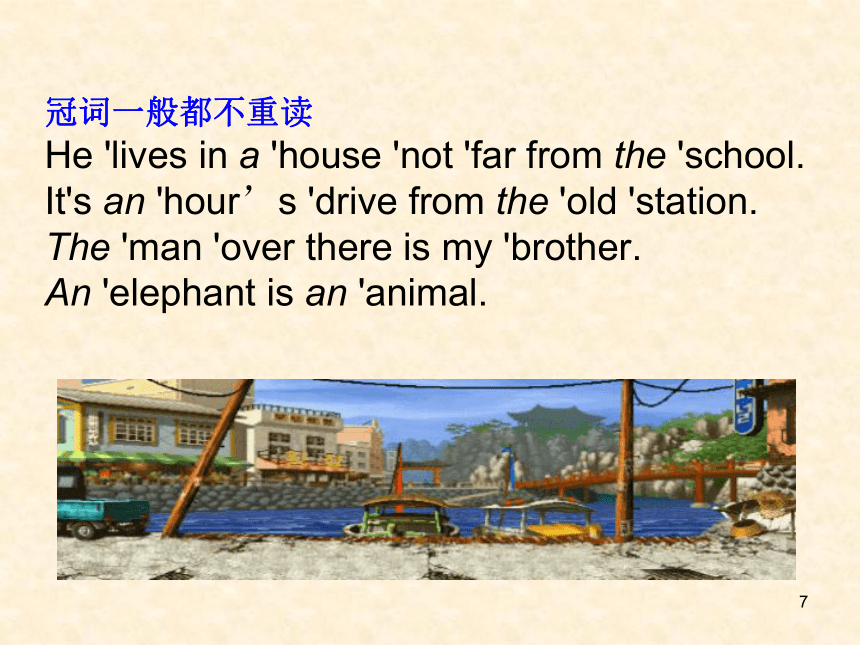
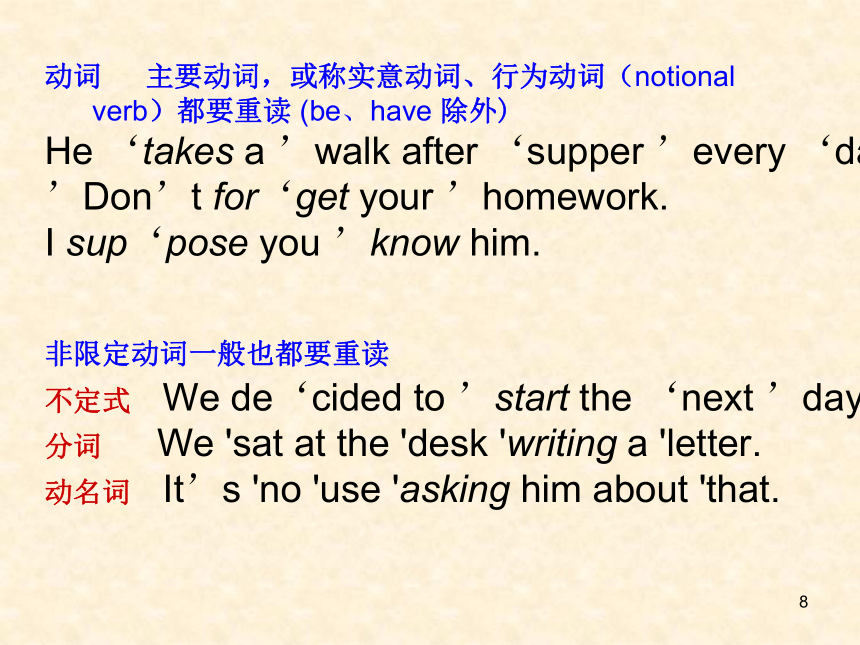
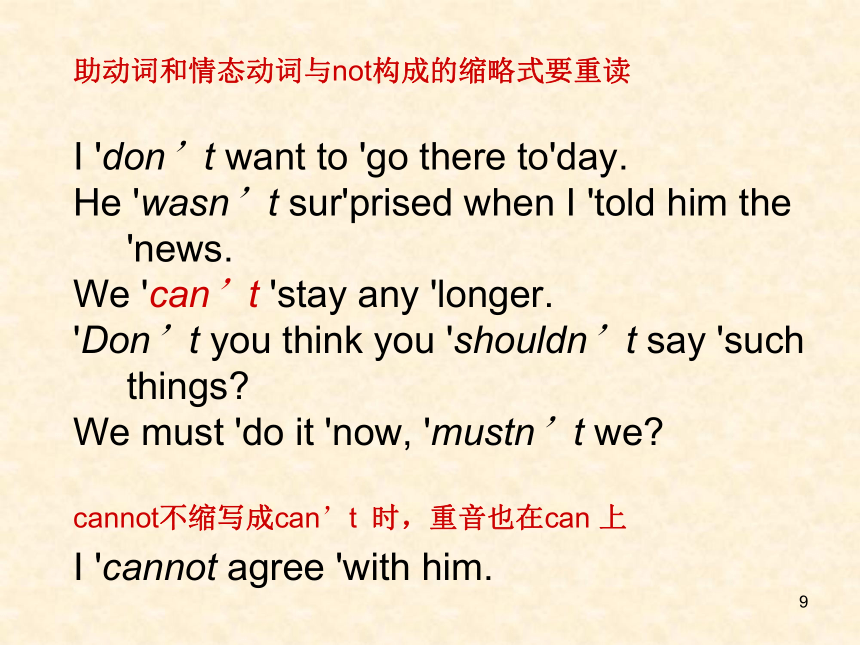
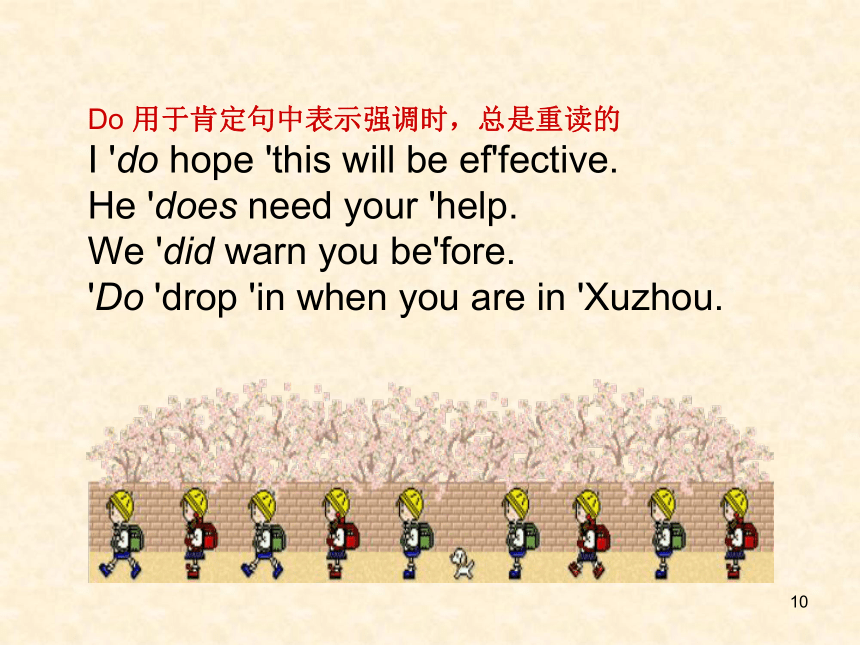
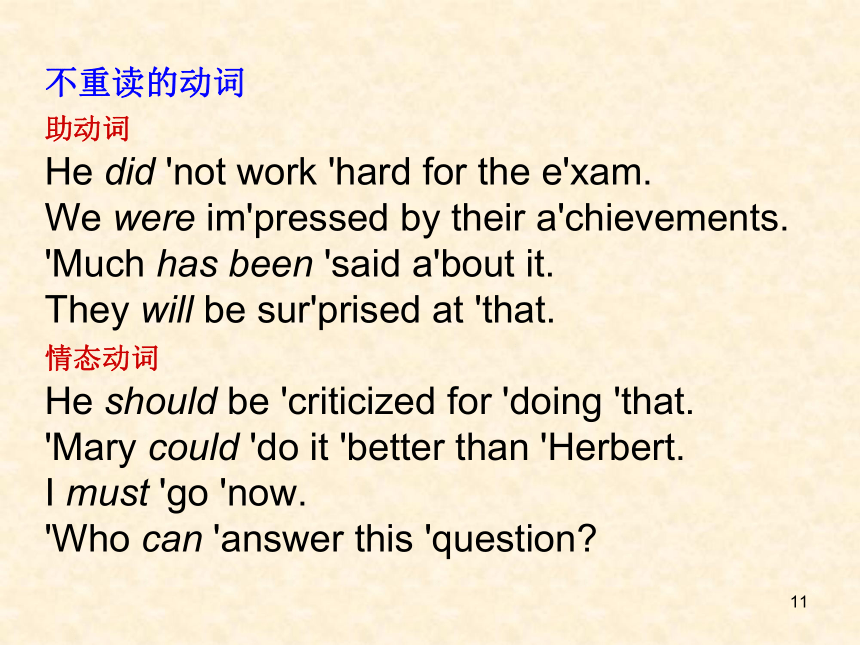
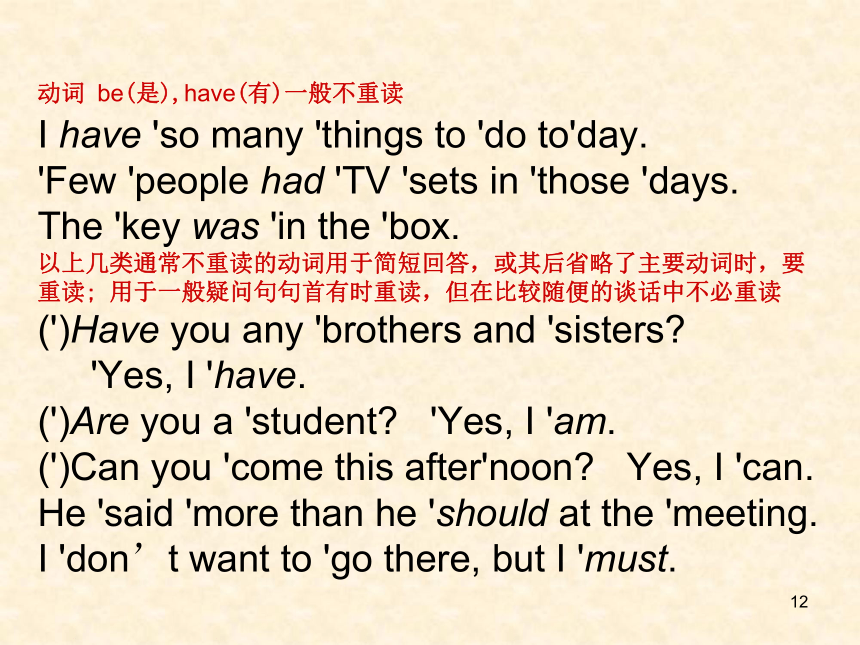
文档简介
句子重音 Sentence Stress
句子重音的一般规则
实词重读 虚词不重读
名词 一般都重读
There is a 'book on the 'desk.
My 'sister 'put up a 'picture on the 'wall.
'John 'wants to 'see the 'teacher after 'class.
An 'elephant is an 'animal.
1
一些含义较广,本身没有很确切内容的名词,如thing, person,
place, 或指一大类人或事物的名词,如 man, woman, fellow,
time, ship,前面有修饰语缩小其范围时,这类名词通常不重读
'That’s a 'nice thing.
(比较: 'That’s a 'nice 'picture.)
He’s an 'easy person to 'get a'long with.
He’s the 'right man for the 'job.
It’s al'ready 'lunch time.
(比较; It’s 'time for 'lunch.)
2
代词
常重读的代词有
1.指示代词
'This is 'not what I 'mean.
'That 'isn’t the one I 'asked for.
'Do you 'like (')these 'flowers?
但如指示代词前后都有重音时,该指示代词可失去重音
'How do you 'like those 'little ones?
'Who 'wrote this 'interesting 'story?
3
2. 名词性物主代词
'Yours is 'much 'nicer than 'mine.
The 'red one is 'his.
但在双重所有格中,物主代词往往不重读
I’m 'writing to a 'friend of mine.
3. 强调代词
I 'saw it my'self.
The 'man him'self 'told me so.
4.疑问代词
'Who are you 'talking to?
'What can I 'do for you?
'Who 'came to 'see you this 'morning?
4
不重读的代词有:人称代词,反身代词,物主代词(形容词性),相互代词,关系代词
He 'hasn’t 'seen my 'brother yet.
He 'hurt himself when he was 'playing 'football.
They 'often 'help each other.
The 'girl who 'spoke to you just 'now is my
'sister.
5
形容词(包括分词作形容词)一般都应重读
数词一般都应重读
The 'streets are 'wide, 'clean and 'beautiful.
'This 'narrow 'valley was the 'scene of a
'famous 'battle.
His 'first daughter is fif'teen.
It’s a 'dull and disap'pointing film.
'That’s ex'citing news.
The 'worried man 'entered the 'crowded 'street.
He 'bought 'ten 'cups and 'I bought only 'four.
6
冠词一般都不重读
He 'lives in a 'house 'not 'far from the 'school.
It's an 'hour’s 'drive from the 'old 'station.
The 'man 'over there is my 'brother.
An 'elephant is an 'animal.
7
动词 主要动词,或称实意动词、行为动词(notional
verb)都要重读 (be、have 除外)
He ‘takes a ’walk after ‘supper ’every ‘day.
’Don’t for‘get your ’homework.
I sup‘pose you ’know him.
非限定动词一般也都要重读
不定式 We de‘cided to ’start the ‘next ’day.
分词 We 'sat at the 'desk 'writing a 'letter.
动名词 It’s 'no 'use 'asking him about 'that.
8
助动词和情态动词与not构成的缩略式要重读
I 'don’t want to 'go there to'day.
He 'wasn’t sur'prised when I 'told him the
'news.
We 'can’t 'stay any 'longer.
'Don’t you think you 'shouldn’t say 'such
things?
We must 'do it 'now, 'mustn’t we?
cannot不缩写成can’t 时,重音也在can 上
I 'cannot agree 'with him.
9
Do 用于肯定句中表示强调时,总是重读的
I 'do hope 'this will be ef'fective.
He 'does need your 'help.
We 'did warn you be'fore.
'Do 'drop 'in when you are in 'Xuzhou.
10
不重读的动词
助动词
He did 'not work 'hard for the e'xam.
We were im'pressed by their a'chievements.
'Much has been 'said a'bout it.
They will be sur'prised at 'that.
情态动词
He should be 'criticized for 'doing 'that.
'Mary could 'do it 'better than 'Herbert.
I must 'go 'now.
'Who can 'answer this 'question?
11
动词 be(是),have(有)一般不重读
I have 'so many 'things to 'do to'day.
'Few 'people had 'TV 'sets in 'those 'days.
The 'key was 'in the 'box.
以上几类通常不重读的动词用于简短回答,或其后省略了主要动词时,要重读; 用于一般疑问句句首有时重读,但在比较随便的谈话中不必重读
(')Have you any 'brothers and 'sisters?
'Yes, I 'have.
(')Are you a 'student? 'Yes, I 'am.
(')Can you 'come this after'noon? Yes, I 'can.
He 'said 'more than he 'should at the 'meeting.
I 'don’t want to 'go there, but I 'must.
12
副词一般都重读
They 'came 'back 'early 'yesterday.
'Where did you 'buy it?
'Why do you 'come?
You 'meet 'people 'everywhere.
I’ve 'never 'heard of 'such a thing be'fore.
Per'haps she’ll ar'rive to'night.
'Tell him to 'come 'in.
A 'car 'dashed 'past.
'Thank you for 'coming to 'see me 'off.
13
但关系副词不重读
He 'visited the 'small 'village where he was
'born.
They 'came 'right at the 'time when we 'needed
their 'help.
'This is the 'reason why they 'failed.
介词 单音节介词一般都不重读
'All but 'one of the 'family are at 'home.
'How 'far is it from 'Paris to 'London?
'What are you 'looking at?
'That’s what I was 'thinking of.
14
多音节的介词常重读,但也可不重读
I’ll 'do it (')after 'lunch.
He 'finished the 'article (')during the 'holidays.
The 'man 'walked a(')long the 'street.
He 'searched a(')mong the 'papers.
I for'got 'all a(')bout it.
I have 'nothing to 'say con(')cerning this
'problem.
'Put it 'opposite the 'door.
15
在不重读的连系动词be或人称代词后,
不论是单音节或多音节介词都重读
They’re 'by the 'window.
He was 'in the 'sitting-room.
Is it 'near the 'post office?
The 'teacher was 'with us at the 'picnic.
It was 'during the 'interval.
He was be'side himself with 'rage.
They are be'hind the 'door.
16
介词在句首时常可重读
'On his 'way 'home he 'met an 'old 'friend.
'In the 'room they 'found a 'little 'boy.
'Under the 'tree 'stands a 'tall man.
17
连接词 单一的并列连接词(包括关联连接词both … and neither…nor等)和从属连词都不重读
He 'came and 'spoke to us.
I 'saw it but 'didn’t 'read it.
'Let’s 'run or we’ll be 'late.
'That 'takes both 'time and 'energy.
Neither 'you nor 'I can 'solve the 'problem.
I sug'gest that we 'give 'up the 'plan.
He was 'angry with me because I was 'late.
The pro'fessor was 'busy 'writing when I 'went
to 'see him.
18
We 'took the 'taxi to the 'station so (that)
we could be in 'time for the 'train.
She 'didn’t ar'range the 'chairs as I 'told her.
'Put it where it can 'easily be 'seen.
He 'wants to 'see you before you 'leave.
She in'sisted on 'going, though I 'told her
'not to.
They were disap'pointed whereas 'we were
de'lighted.
You 'can’t under'stand it until you 'read it to
the 'end.
19
连接词词组 其中重要的词要重读
还有一些意味较强的连接词也要重读
If 'only I 'knew how to 'do it.
He’ll 'help us on con'dition that we 'trust him.
We’ll 'start to'morrow 'even if it 'rains.
They have 'never 'met 'ever since '19'80.
The 'meeting will be'gin as 'soon as the
'guests 'come.
You’ll suc'ceed so 'long as you 'work 'hard.
It’s 'such a 'pity that you 'can’t 'come.
20
He 'spoke 'so 'fast that I could 'hardly 'follow
him.
Will you 'try a'gain sup'posing you 'fail?
I must 'go there al'though it is 'raining.
The 'school bus will 'leave di'rectly the'bell
'rings.
You can 'never suc'ceed un'less you 'work
'hard.
21
从句放在主句前面时,处于句首的连接词常重读
(that 除外)
'When he 'comes I’ll intro'duce him to you.
'After I’ve 'finished it I’ll 'show it to you.
'As I was 'waiting for the 'bus, it 'suddenly
be'gan to 'rain.
但 That we can 'do it with'out him is ab'surd.
22
连接代词who (whom, whose) what, which 和连接副词
when, where, how, why 可以重读,也可以不重读
I 'wonder 'who 'that was.
'Ask him 'which is 'better.
I 'don’t 'know 'how they 'are.
I 'don’t 'know how 'things are in 'their 'school.
I’m 'not sure 'when he’s 'coming.
I 'can’t under'stand 'why he re'fuses to 'go.
Do you 'see what I 'mean?
He 'doesn’t know 'what he should 'do 'next.
23
感叹词
感叹词是表示某种感情的自然一般都重读
'Ah! 'Oh!
'Ugh![‘uh] 'Eh?
'Fancy! 'Goodness!
'Nonsense! Hel'lo!
In'deed! 'How 'awful!
但如果后面紧跟一个有强重音的词,单音节的
感叹词可以不重读,但音调很高
Ah ''no! Oh ''well! Oh ''dear!
24
不合乎语句重音一般规律的例外情况
任何本来有句子重音的词,如果上文刚出现过,第二次提
到时一般不应重读
--'How 'many 'times have you 'been there?
--'Three times.
The 'boy 'shouted to the 'other boys.
--They 'want 'strong men.
--'Very 'well. I 'am strong.
'Study as 'Lenin studied.
A 'new com'mittee has been 'set 'up and
'Dr 'Li is 'on the committee.
25
名词 street 在街名中不重读
'Oxford Street 'Downing Street
'Eighth Street ‘Wall Street
但road, avenue, lane, way, hill, town, park,
palace等词在街名地名中都要重读
'York 'Road
'West 'Lake
'Hyde 'Park
'Buckingham 'Palace
'Hampton 'Court
26
一个名词受另一个名词(或形容词)修饰时,如修饰语与别的词形成对比时,或两个词意义上联系很紧密时,被修饰的名词不重读,只重读前面的修饰语
'railway journey 坐火车旅行(区别于坐汽车或飞机旅行)
'pleasure trip 旅游(区别于因事旅行)
'high school 中学
'safety razor 安全剃刀
'life-saving apparatus 救生装置
'door handle 'tennis ball
'camping ground 'golf club
'violin string exami'nation paper
27
指示代词this, that, these, those有时没有很强的指示意味,
其意义很接近于冠词the,特别是当其修饰的名词前面已提
到时,这些指示代词不重读
He 'managed this 'matter 'wonderfully.
It is 'necessary to 'take these 'measures.
He 'couldn’t 'bear the 'gaze of those 'eyes.
在 this 'morning, this 'after'noon, this 'evening
等词组中,this 不重读
28
such 后面跟有强调的词时不重读
such a 'curious 'shape
such 'quantities of 'wood
如果后面的词不可能重时,则重读 such
'Such a thing should 'never have 'happened.
副词so在 think so, do so等词组里不重读
I 'think so. I 'didn’t 'say so.
I 'believe so. 'Who 'told you to 'do so?
29
副词so, now, then用来在语气上连接上下文时,不重读
So he 'went into the 'garden.
Now 'listen to me 'carefully.
Then 'don’t for'get to 'write to me after
you ar'rive there.
30
某些插入语不须重读
I’m a'fraid he’s 'not 'coming.
He’s 'not 'coming, I’m afraid.
'Please 'sit 'down. 'Sit 'down, please.
He 'said, “I’m 'sorry.” “I’m 'sorry,” he said.
One作为数词要重读,但用作代词时不重读
'That’s a 'good one.
'How are the 'little ones?
You’ve 'got the 'wrong one, 'I want the 'green one.
31
节奏
O O O O
'time’s 'up. 'make 'haste
'next 'week 'what’s 'this
'work 'hard 'well 'done
'all 'right 'quite 'good
'Yes, 'please. 'hold 'on
'that’s 'true 'too 'bad
'good 'news 'this 'month
'not 'yet 'come 'in
32
O o O O o O
'never 'mind 'wait and 'see
'leave at 'once 'word by 'word
'let me 'see 'thanks a 'lot
'out of 'date 'quite a 'lot
'try it 'out 'good i'dea
'come a'long 'far and 'wide
'time and 'tide 'little 'girl
'what a 'day
33
O o O o O o O o
'wait a 'moment 'give me 'this one
'let’s get 'started 'spring is 'coming
'Merry 'Christmas. 'come and 'help me
'glad to 'see you 'very 'funny
'let me 'help you 'who can 'help me
'quite a 'lot of 'rather 'boring
'go and 'get it 'when to 'do it
'just ‘imagine 'time is 'precious
34
o O o O o O o O
the 'latest 'news a 'waste of 'time
he’s 'late for 'class she’s 'gone 'away
a 'lot of 'noise I’d 'like to 'come
it 'doesn’t 'work we’d 'better 'go
a 'sign of 'smoke he 'always 'sings
it’s 'time for 'lunch I’ll 'see you 'off
it’s 'hard to 'say a 'day of 'work
I’ve 'no 'idea I’m 'sure you 'will
35
O o o O
'lots to be 'done
'lend me a 'hand
'get in the 'crops
'nothing at 'all
'bring him 'along
'send it by 'mail
'not in the 'least
'clear it 'away
'once in a 'while
O o o o O
'carry it 'away
'follow my 'advice
'see you in a 'week
'try to be in 'time
'come and have a 'look
'leave it on the 'desk
'cut it with a 'knife
'everything is 'clear
'bring along your 'friend
36
o O o O o
I’m 'glad to 'see you.
You’re 'always 'welcome.
I 'hope you 'like it.
I’d 'like to 'hear it.
I 'beg your 'pardon.
You’d 'better 'hurry.
I’m 'very 'sorry.
It doesn’t 'matter.
He’s 'rather 'funny.
37
o O o o O o o
I’ll 'borrow a'nother one.
You’ll 'get it on 'Saturday.
Per'haps you’ve 'heard of it.
They’ve 'all gone on 'holiday.
It’s 'very un'fortunate.
Let’s 'open the 'other one.
38
语调
在英语说话和朗读时不但要注意句子的重读、音的长度、音的变化,而且很重要的是要注意句子或短语的语调
在英语中通过语调的高低、句子重读、音的长度,使语言表达丰富多彩,声情并茂。英语语调或升或降,或高或低,一般落在短语或句子的最后一个重音上
可以将英语语调归纳为四种:
降调 升调
平调 降升调
╮
╯
?
~
39
用降调的句型
1. 陈述句
Thank you. Not at all.
You’re quite right.
I’m afraid I must be off.
40
2. 特殊疑问句
What time can I see you?
What’s the matter with you?
41
3. 祈使句
Come in. Close the door.
Fetch me my gloves.
Please drop in any time you like.
Hurry up or we’ll miss the train.
42
4. 感叹句
What a hot day!
Isn’t it lovely!
43
用升调的句型
1. 一般疑问句
Have you been staying here long?
Are you free tomorrow morning?
Is this lesson too difficult?
44
2. 祈使句
表示很婉转和客气的请求,
祈使句有时也可以一般疑问句的形式出现
Won’t you take a seat?
Shall we go to the dining room?
45
3. 陈述句
有些陈述句包含不肯定、疑惑、安慰、抱歉、无能为力、轻蔑、不在乎、不耐烦,以及其他一些没有直接表达出来的情绪时,用升调
I can’t wait that long.
I thought everything would be all right.
I’m sorry to have kept you waiting.
上述某些情绪,如不肯定、疑惑、轻蔑、无可奈何等,也可以用降升调,情绪更为强烈
46
语调群 1. 升调在前,降调在后
选择疑问句,要求回答者选择任何一个
Do you prefer tea or coffee?
Is he still here or has he gone home already?
以状语或状语从句开始的句子
At ten o’clock in the morning the contest began.
计数或点东西
a chair, a table, a bed and a desk
47
2. 降调在前,升调在后
反意疑问句,表示说话人有一些疑惑,要肯定以下自己的看法
You went to the concert yesterday, didn’t you?
He works in a bank in town, doesn’t he?
前面是陈述句,后面有一个表示不肯定或有疑虑的附加语
It’s going to rain, I’m afraid.
在句末称呼人时,用升调
Tell me the truth, George.
48
3. 前后都是降调
反意疑问句,这类反意疑问句疑问成分很少,答案无疑已经知道
It’s a fine day, isn’t it?
She is talking just like her mother, isn’t she?
主语在前,状语或状语从句在后的陈述句
He will know better when he gets older.
有两个或两个以上并列句的句子
The telephone rang, but I didn’t answer it.
49
Thank You
50
句子重音的一般规则
实词重读 虚词不重读
名词 一般都重读
There is a 'book on the 'desk.
My 'sister 'put up a 'picture on the 'wall.
'John 'wants to 'see the 'teacher after 'class.
An 'elephant is an 'animal.
1
一些含义较广,本身没有很确切内容的名词,如thing, person,
place, 或指一大类人或事物的名词,如 man, woman, fellow,
time, ship,前面有修饰语缩小其范围时,这类名词通常不重读
'That’s a 'nice thing.
(比较: 'That’s a 'nice 'picture.)
He’s an 'easy person to 'get a'long with.
He’s the 'right man for the 'job.
It’s al'ready 'lunch time.
(比较; It’s 'time for 'lunch.)
2
代词
常重读的代词有
1.指示代词
'This is 'not what I 'mean.
'That 'isn’t the one I 'asked for.
'Do you 'like (')these 'flowers?
但如指示代词前后都有重音时,该指示代词可失去重音
'How do you 'like those 'little ones?
'Who 'wrote this 'interesting 'story?
3
2. 名词性物主代词
'Yours is 'much 'nicer than 'mine.
The 'red one is 'his.
但在双重所有格中,物主代词往往不重读
I’m 'writing to a 'friend of mine.
3. 强调代词
I 'saw it my'self.
The 'man him'self 'told me so.
4.疑问代词
'Who are you 'talking to?
'What can I 'do for you?
'Who 'came to 'see you this 'morning?
4
不重读的代词有:人称代词,反身代词,物主代词(形容词性),相互代词,关系代词
He 'hasn’t 'seen my 'brother yet.
He 'hurt himself when he was 'playing 'football.
They 'often 'help each other.
The 'girl who 'spoke to you just 'now is my
'sister.
5
形容词(包括分词作形容词)一般都应重读
数词一般都应重读
The 'streets are 'wide, 'clean and 'beautiful.
'This 'narrow 'valley was the 'scene of a
'famous 'battle.
His 'first daughter is fif'teen.
It’s a 'dull and disap'pointing film.
'That’s ex'citing news.
The 'worried man 'entered the 'crowded 'street.
He 'bought 'ten 'cups and 'I bought only 'four.
6
冠词一般都不重读
He 'lives in a 'house 'not 'far from the 'school.
It's an 'hour’s 'drive from the 'old 'station.
The 'man 'over there is my 'brother.
An 'elephant is an 'animal.
7
动词 主要动词,或称实意动词、行为动词(notional
verb)都要重读 (be、have 除外)
He ‘takes a ’walk after ‘supper ’every ‘day.
’Don’t for‘get your ’homework.
I sup‘pose you ’know him.
非限定动词一般也都要重读
不定式 We de‘cided to ’start the ‘next ’day.
分词 We 'sat at the 'desk 'writing a 'letter.
动名词 It’s 'no 'use 'asking him about 'that.
8
助动词和情态动词与not构成的缩略式要重读
I 'don’t want to 'go there to'day.
He 'wasn’t sur'prised when I 'told him the
'news.
We 'can’t 'stay any 'longer.
'Don’t you think you 'shouldn’t say 'such
things?
We must 'do it 'now, 'mustn’t we?
cannot不缩写成can’t 时,重音也在can 上
I 'cannot agree 'with him.
9
Do 用于肯定句中表示强调时,总是重读的
I 'do hope 'this will be ef'fective.
He 'does need your 'help.
We 'did warn you be'fore.
'Do 'drop 'in when you are in 'Xuzhou.
10
不重读的动词
助动词
He did 'not work 'hard for the e'xam.
We were im'pressed by their a'chievements.
'Much has been 'said a'bout it.
They will be sur'prised at 'that.
情态动词
He should be 'criticized for 'doing 'that.
'Mary could 'do it 'better than 'Herbert.
I must 'go 'now.
'Who can 'answer this 'question?
11
动词 be(是),have(有)一般不重读
I have 'so many 'things to 'do to'day.
'Few 'people had 'TV 'sets in 'those 'days.
The 'key was 'in the 'box.
以上几类通常不重读的动词用于简短回答,或其后省略了主要动词时,要重读; 用于一般疑问句句首有时重读,但在比较随便的谈话中不必重读
(')Have you any 'brothers and 'sisters?
'Yes, I 'have.
(')Are you a 'student? 'Yes, I 'am.
(')Can you 'come this after'noon? Yes, I 'can.
He 'said 'more than he 'should at the 'meeting.
I 'don’t want to 'go there, but I 'must.
12
副词一般都重读
They 'came 'back 'early 'yesterday.
'Where did you 'buy it?
'Why do you 'come?
You 'meet 'people 'everywhere.
I’ve 'never 'heard of 'such a thing be'fore.
Per'haps she’ll ar'rive to'night.
'Tell him to 'come 'in.
A 'car 'dashed 'past.
'Thank you for 'coming to 'see me 'off.
13
但关系副词不重读
He 'visited the 'small 'village where he was
'born.
They 'came 'right at the 'time when we 'needed
their 'help.
'This is the 'reason why they 'failed.
介词 单音节介词一般都不重读
'All but 'one of the 'family are at 'home.
'How 'far is it from 'Paris to 'London?
'What are you 'looking at?
'That’s what I was 'thinking of.
14
多音节的介词常重读,但也可不重读
I’ll 'do it (')after 'lunch.
He 'finished the 'article (')during the 'holidays.
The 'man 'walked a(')long the 'street.
He 'searched a(')mong the 'papers.
I for'got 'all a(')bout it.
I have 'nothing to 'say con(')cerning this
'problem.
'Put it 'opposite the 'door.
15
在不重读的连系动词be或人称代词后,
不论是单音节或多音节介词都重读
They’re 'by the 'window.
He was 'in the 'sitting-room.
Is it 'near the 'post office?
The 'teacher was 'with us at the 'picnic.
It was 'during the 'interval.
He was be'side himself with 'rage.
They are be'hind the 'door.
16
介词在句首时常可重读
'On his 'way 'home he 'met an 'old 'friend.
'In the 'room they 'found a 'little 'boy.
'Under the 'tree 'stands a 'tall man.
17
连接词 单一的并列连接词(包括关联连接词both … and neither…nor等)和从属连词都不重读
He 'came and 'spoke to us.
I 'saw it but 'didn’t 'read it.
'Let’s 'run or we’ll be 'late.
'That 'takes both 'time and 'energy.
Neither 'you nor 'I can 'solve the 'problem.
I sug'gest that we 'give 'up the 'plan.
He was 'angry with me because I was 'late.
The pro'fessor was 'busy 'writing when I 'went
to 'see him.
18
We 'took the 'taxi to the 'station so (that)
we could be in 'time for the 'train.
She 'didn’t ar'range the 'chairs as I 'told her.
'Put it where it can 'easily be 'seen.
He 'wants to 'see you before you 'leave.
She in'sisted on 'going, though I 'told her
'not to.
They were disap'pointed whereas 'we were
de'lighted.
You 'can’t under'stand it until you 'read it to
the 'end.
19
连接词词组 其中重要的词要重读
还有一些意味较强的连接词也要重读
If 'only I 'knew how to 'do it.
He’ll 'help us on con'dition that we 'trust him.
We’ll 'start to'morrow 'even if it 'rains.
They have 'never 'met 'ever since '19'80.
The 'meeting will be'gin as 'soon as the
'guests 'come.
You’ll suc'ceed so 'long as you 'work 'hard.
It’s 'such a 'pity that you 'can’t 'come.
20
He 'spoke 'so 'fast that I could 'hardly 'follow
him.
Will you 'try a'gain sup'posing you 'fail?
I must 'go there al'though it is 'raining.
The 'school bus will 'leave di'rectly the'bell
'rings.
You can 'never suc'ceed un'less you 'work
'hard.
21
从句放在主句前面时,处于句首的连接词常重读
(that 除外)
'When he 'comes I’ll intro'duce him to you.
'After I’ve 'finished it I’ll 'show it to you.
'As I was 'waiting for the 'bus, it 'suddenly
be'gan to 'rain.
但 That we can 'do it with'out him is ab'surd.
22
连接代词who (whom, whose) what, which 和连接副词
when, where, how, why 可以重读,也可以不重读
I 'wonder 'who 'that was.
'Ask him 'which is 'better.
I 'don’t 'know 'how they 'are.
I 'don’t 'know how 'things are in 'their 'school.
I’m 'not sure 'when he’s 'coming.
I 'can’t under'stand 'why he re'fuses to 'go.
Do you 'see what I 'mean?
He 'doesn’t know 'what he should 'do 'next.
23
感叹词
感叹词是表示某种感情的自然一般都重读
'Ah! 'Oh!
'Ugh![‘uh] 'Eh?
'Fancy! 'Goodness!
'Nonsense! Hel'lo!
In'deed! 'How 'awful!
但如果后面紧跟一个有强重音的词,单音节的
感叹词可以不重读,但音调很高
Ah ''no! Oh ''well! Oh ''dear!
24
不合乎语句重音一般规律的例外情况
任何本来有句子重音的词,如果上文刚出现过,第二次提
到时一般不应重读
--'How 'many 'times have you 'been there?
--'Three times.
The 'boy 'shouted to the 'other boys.
--They 'want 'strong men.
--'Very 'well. I 'am strong.
'Study as 'Lenin studied.
A 'new com'mittee has been 'set 'up and
'Dr 'Li is 'on the committee.
25
名词 street 在街名中不重读
'Oxford Street 'Downing Street
'Eighth Street ‘Wall Street
但road, avenue, lane, way, hill, town, park,
palace等词在街名地名中都要重读
'York 'Road
'West 'Lake
'Hyde 'Park
'Buckingham 'Palace
'Hampton 'Court
26
一个名词受另一个名词(或形容词)修饰时,如修饰语与别的词形成对比时,或两个词意义上联系很紧密时,被修饰的名词不重读,只重读前面的修饰语
'railway journey 坐火车旅行(区别于坐汽车或飞机旅行)
'pleasure trip 旅游(区别于因事旅行)
'high school 中学
'safety razor 安全剃刀
'life-saving apparatus 救生装置
'door handle 'tennis ball
'camping ground 'golf club
'violin string exami'nation paper
27
指示代词this, that, these, those有时没有很强的指示意味,
其意义很接近于冠词the,特别是当其修饰的名词前面已提
到时,这些指示代词不重读
He 'managed this 'matter 'wonderfully.
It is 'necessary to 'take these 'measures.
He 'couldn’t 'bear the 'gaze of those 'eyes.
在 this 'morning, this 'after'noon, this 'evening
等词组中,this 不重读
28
such 后面跟有强调的词时不重读
such a 'curious 'shape
such 'quantities of 'wood
如果后面的词不可能重时,则重读 such
'Such a thing should 'never have 'happened.
副词so在 think so, do so等词组里不重读
I 'think so. I 'didn’t 'say so.
I 'believe so. 'Who 'told you to 'do so?
29
副词so, now, then用来在语气上连接上下文时,不重读
So he 'went into the 'garden.
Now 'listen to me 'carefully.
Then 'don’t for'get to 'write to me after
you ar'rive there.
30
某些插入语不须重读
I’m a'fraid he’s 'not 'coming.
He’s 'not 'coming, I’m afraid.
'Please 'sit 'down. 'Sit 'down, please.
He 'said, “I’m 'sorry.” “I’m 'sorry,” he said.
One作为数词要重读,但用作代词时不重读
'That’s a 'good one.
'How are the 'little ones?
You’ve 'got the 'wrong one, 'I want the 'green one.
31
节奏
O O O O
'time’s 'up. 'make 'haste
'next 'week 'what’s 'this
'work 'hard 'well 'done
'all 'right 'quite 'good
'Yes, 'please. 'hold 'on
'that’s 'true 'too 'bad
'good 'news 'this 'month
'not 'yet 'come 'in
32
O o O O o O
'never 'mind 'wait and 'see
'leave at 'once 'word by 'word
'let me 'see 'thanks a 'lot
'out of 'date 'quite a 'lot
'try it 'out 'good i'dea
'come a'long 'far and 'wide
'time and 'tide 'little 'girl
'what a 'day
33
O o O o O o O o
'wait a 'moment 'give me 'this one
'let’s get 'started 'spring is 'coming
'Merry 'Christmas. 'come and 'help me
'glad to 'see you 'very 'funny
'let me 'help you 'who can 'help me
'quite a 'lot of 'rather 'boring
'go and 'get it 'when to 'do it
'just ‘imagine 'time is 'precious
34
o O o O o O o O
the 'latest 'news a 'waste of 'time
he’s 'late for 'class she’s 'gone 'away
a 'lot of 'noise I’d 'like to 'come
it 'doesn’t 'work we’d 'better 'go
a 'sign of 'smoke he 'always 'sings
it’s 'time for 'lunch I’ll 'see you 'off
it’s 'hard to 'say a 'day of 'work
I’ve 'no 'idea I’m 'sure you 'will
35
O o o O
'lots to be 'done
'lend me a 'hand
'get in the 'crops
'nothing at 'all
'bring him 'along
'send it by 'mail
'not in the 'least
'clear it 'away
'once in a 'while
O o o o O
'carry it 'away
'follow my 'advice
'see you in a 'week
'try to be in 'time
'come and have a 'look
'leave it on the 'desk
'cut it with a 'knife
'everything is 'clear
'bring along your 'friend
36
o O o O o
I’m 'glad to 'see you.
You’re 'always 'welcome.
I 'hope you 'like it.
I’d 'like to 'hear it.
I 'beg your 'pardon.
You’d 'better 'hurry.
I’m 'very 'sorry.
It doesn’t 'matter.
He’s 'rather 'funny.
37
o O o o O o o
I’ll 'borrow a'nother one.
You’ll 'get it on 'Saturday.
Per'haps you’ve 'heard of it.
They’ve 'all gone on 'holiday.
It’s 'very un'fortunate.
Let’s 'open the 'other one.
38
语调
在英语说话和朗读时不但要注意句子的重读、音的长度、音的变化,而且很重要的是要注意句子或短语的语调
在英语中通过语调的高低、句子重读、音的长度,使语言表达丰富多彩,声情并茂。英语语调或升或降,或高或低,一般落在短语或句子的最后一个重音上
可以将英语语调归纳为四种:
降调 升调
平调 降升调
╮
╯
?
~
39
用降调的句型
1. 陈述句
Thank you. Not at all.
You’re quite right.
I’m afraid I must be off.
40
2. 特殊疑问句
What time can I see you?
What’s the matter with you?
41
3. 祈使句
Come in. Close the door.
Fetch me my gloves.
Please drop in any time you like.
Hurry up or we’ll miss the train.
42
4. 感叹句
What a hot day!
Isn’t it lovely!
43
用升调的句型
1. 一般疑问句
Have you been staying here long?
Are you free tomorrow morning?
Is this lesson too difficult?
44
2. 祈使句
表示很婉转和客气的请求,
祈使句有时也可以一般疑问句的形式出现
Won’t you take a seat?
Shall we go to the dining room?
45
3. 陈述句
有些陈述句包含不肯定、疑惑、安慰、抱歉、无能为力、轻蔑、不在乎、不耐烦,以及其他一些没有直接表达出来的情绪时,用升调
I can’t wait that long.
I thought everything would be all right.
I’m sorry to have kept you waiting.
上述某些情绪,如不肯定、疑惑、轻蔑、无可奈何等,也可以用降升调,情绪更为强烈
46
语调群 1. 升调在前,降调在后
选择疑问句,要求回答者选择任何一个
Do you prefer tea or coffee?
Is he still here or has he gone home already?
以状语或状语从句开始的句子
At ten o’clock in the morning the contest began.
计数或点东西
a chair, a table, a bed and a desk
47
2. 降调在前,升调在后
反意疑问句,表示说话人有一些疑惑,要肯定以下自己的看法
You went to the concert yesterday, didn’t you?
He works in a bank in town, doesn’t he?
前面是陈述句,后面有一个表示不肯定或有疑虑的附加语
It’s going to rain, I’m afraid.
在句末称呼人时,用升调
Tell me the truth, George.
48
3. 前后都是降调
反意疑问句,这类反意疑问句疑问成分很少,答案无疑已经知道
It’s a fine day, isn’t it?
She is talking just like her mother, isn’t she?
主语在前,状语或状语从句在后的陈述句
He will know better when he gets older.
有两个或两个以上并列句的句子
The telephone rang, but I didn’t answer it.
49
Thank You
50
同课章节目录
- 名词
- 动词/动词短语
- 一般现在时及其被动式
- 一般过去时及其被动式
- 现在进行时及其被动式
- 过去进行时及其被动式
- 将来进行时及其被动式
- 现在完成时及其被动式
- 过去完成时及其被动式
- 一般将来时及其被动式
- 过去将来时及其被动式
- 现在完成进行时及其被动式
- 将来完成时及其被动式
- 副词
- 介词/介词短语
- 连词/连接词
- 数词/量词
- 冠词
- 形容词
- 非谓语动词
- 句型
- 简单句与并列句
- 复合句
- 主谓一致
- 倒装与省略
- 强调句
- 虚拟语气
- 插入语
- 固定句型
- 祈使句/感叹句
- 疑问句/反义疑问句
- 非限制性定语从句
- 句型转换
- 定语从句
- 表语从句
- 宾语从句
- 主语从句
- 动词时态与语态
- 虚拟语气与情态动词
- 主谓一致
- 独立主格结构、with的复合结构
- 情态动词
- 状语从句
- 定语从句
- 特殊句式
- 交际用语
- 代词/不定代词
- 名词性从句
- 同位语从句
- 表语从句
- 宾语从句
- 主语从句
- 直接引语和间接引语
- 构词法(word formation)
